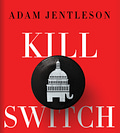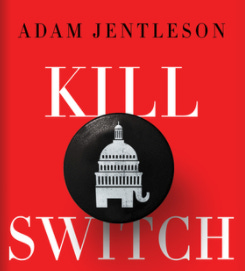How the filibuster goes down
There is a tendency in politics to believe that if a thing doesn’t happen immediately, or if it’s not happening right now, then it will never happen. This myopia of the present is understandable, but it’s not hard to see the fallacy: Look back in time and you will see that things have, in fact, happened. And in the future, things will continue to happen. That I can guarantee.
The thing that has not happened in 2021 is the elimination -- or reform,* if you prefer -- of the filibuster. But that doesn’t mean it won’t happen.
The process for this to unfold was always going to be a multi-stage process. Adam Jentleson, author of the book Kill Switch on the history of the filibuster, refers to them as Acts.
Act I was getting filibuster reform on the agenda and getting most of the Democratic caucus. That happened early on, with even Joe Manchin agreeing that the silent filibuster needed to end, and perhaps should be replaced by a talking filibuster. He backtracked under pressure, but that’s all part of Act I.
Act II is demonstrating to the public and to people like Manchin that the possibility of bipartisan cooperation with Republicans has left the building. That’s been slow, because there has been little to call attention to its absence. Democrats have used the majority-only reconciliation process for their major legislation and Republicans have largely declined to bottle up the Senate pointlessly, as they did in 2009-’10. To demonstrate the intractable nature of Republican intransigence, Democratic Leader Chuck Schumer needs them to filibuster something indefensibly, something with high stakes, and something that Democrats are unified in support of. That’s surprisingly hard to find, but Republicans are about to hand one to Democrats, and there’s likely another one coming in a few months.
Republicans in the House spent months negotiating with Democrats on the creation of a January 6th commission, and bailed at the last minute, with the party leadership opposing it. But more than 30 Republicans still voted for it, along with all Democrats.
In the Senate, Republicans are now claiming they won’t support a ⅙ commission after all, and there may not be 10 in their party willing to vote for it. That means they’ll be filibustering the creation of that commission. “When the filibuster is actually used, it becomes an exhibit in the case against continuing it," Sen. Dick Durbin said, and filibustering the commission will be Exhibit A.
Manchin expressed his dismay at the GOP obstruction. “So disheartening. It makes you really concerned about our country,” Manchin said. A reporter asked if that counted as abuse of the filibuster: “I’m still praying we’ve still got 10 good solid patriots within that conference.”
That is a very Manchin answer: He has long made clear he very much does not want to do anything to weaken the filibuster. Indeed, he would be heartbroken if he had to do so. But if he’s forced to do it for the good of the country, because there aren’t enough good solid patriots willing to put that country first, well then it’s back on the table. The filibuster is not a suicide pact.
The fight over the commission and the filibuster is coming to a head as early as next week.
Act III is the fight over what the new rules would be. As those new rules are hashed out, a group of senators will likely form, looking for a way to find 10 Republicans to stave off the rules change. In past crises, enough senators in the middle have been found to postpone the reckoning. It happened multiple times before the rules were changed in 2013, but the process postpones the inevitable, rather than stopping it cold.
There’s a decent-enough chance the Senate will find some way to punt the filibuster debate this time around and compromise on the commission. But the fight will have left a mark, and the next time Republicans rise up, the Manchin wing will have less patience.
And the next such moment already has a date on the calendar, if one doesn’t come sooner: July 31, 2021.
That the day the debt ceiling needs to be lifted, or the U.S. defaults on its debt, sparking a global financial crisis. In 2011, Republicans extracted draconian concessions for increasing the debt limit, hobbling the recovery and likely costing Democrats the Senate in 2014 (and with it the chance to confirm Merrick Garland to the Supreme Court).
Democrats have been clear that this time they’re not negotiating with Republicans over raising the debt limit. Republicans have been just as clear they won’t support what they call a “clean” debt ceiling increase.
If the option is a global financial crisis or a vote to reform the filibuster in order to raise the debt ceiling, the choice even for Manchin is an obvious one: ditch the filibuster. That would be the final act of the play.
It would also open up new legislative possibilities for the rest of 2021 and 2022, including election reform (HR1), the PRO Act, health care policy that couldn’t be done through reconciliation, raising the minimum wage, and on and on. And once Republicans like Susan Collins see that legislation is being worked on with an eye toward actually passing it, they’ll want to play a part. And once they do, the bill becomes bipartisan. Ending the filibuster is far more likely to bring on bipartisanship than keeping it.
The PRO Act is still three cosponsors short of 50, and I wrote this week about how one of them, Mark Kelly of Arizona, served on a number of boards for companies that would be heavily impacted by the sweeping labor reform bill.
With my new colleague Sara Sirota -- follow her here -- I also wrote about the fight between Schumer and Manchin over democracy reform, with Schumer publicly slapping down a Manchin proposal.
And this week’s Deconstructed is an interview with a Palestinian journalist in Ramallah.
*Reform is more accurate because whatever happens will likely still include something that can be called a filibuster, but it won’t allow 41 senators to endlessly block legislation.


